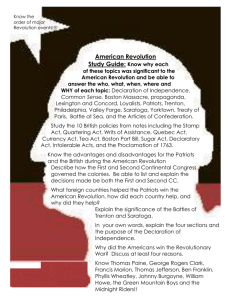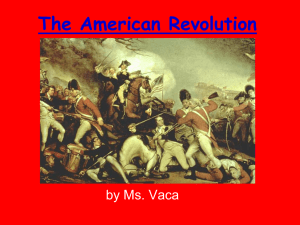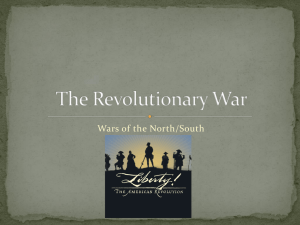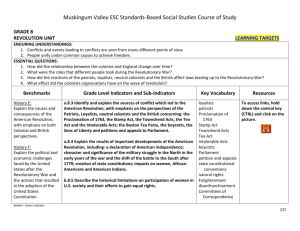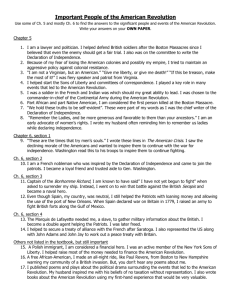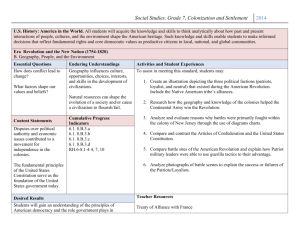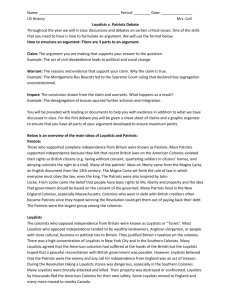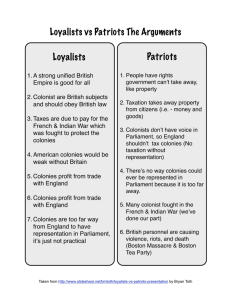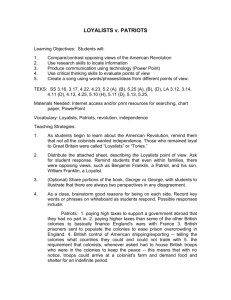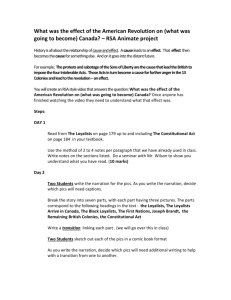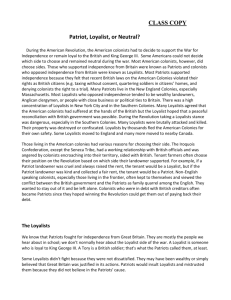File
advertisement
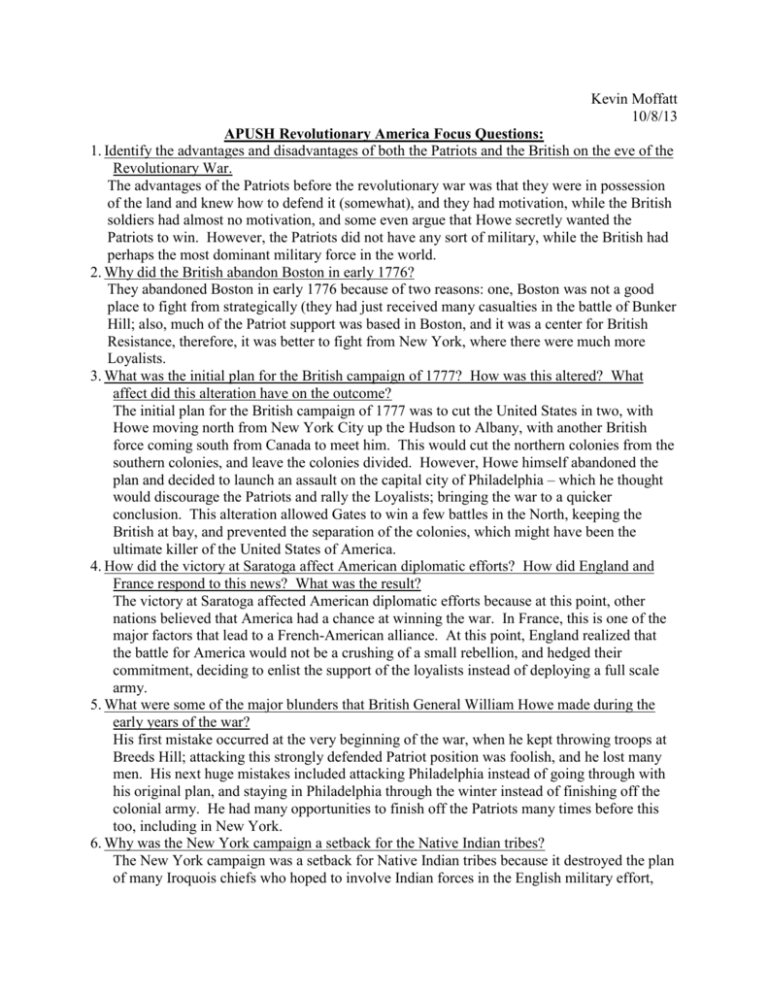
Kevin Moffatt 10/8/13 APUSH Revolutionary America Focus Questions: 1. Identify the advantages and disadvantages of both the Patriots and the British on the eve of the Revolutionary War. The advantages of the Patriots before the revolutionary war was that they were in possession of the land and knew how to defend it (somewhat), and they had motivation, while the British soldiers had almost no motivation, and some even argue that Howe secretly wanted the Patriots to win. However, the Patriots did not have any sort of military, while the British had perhaps the most dominant military force in the world. 2. Why did the British abandon Boston in early 1776? They abandoned Boston in early 1776 because of two reasons: one, Boston was not a good place to fight from strategically (they had just received many casualties in the battle of Bunker Hill; also, much of the Patriot support was based in Boston, and it was a center for British Resistance, therefore, it was better to fight from New York, where there were much more Loyalists. 3. What was the initial plan for the British campaign of 1777? How was this altered? What affect did this alteration have on the outcome? The initial plan for the British campaign of 1777 was to cut the United States in two, with Howe moving north from New York City up the Hudson to Albany, with another British force coming south from Canada to meet him. This would cut the northern colonies from the southern colonies, and leave the colonies divided. However, Howe himself abandoned the plan and decided to launch an assault on the capital city of Philadelphia – which he thought would discourage the Patriots and rally the Loyalists; bringing the war to a quicker conclusion. This alteration allowed Gates to win a few battles in the North, keeping the British at bay, and prevented the separation of the colonies, which might have been the ultimate killer of the United States of America. 4. How did the victory at Saratoga affect American diplomatic efforts? How did England and France respond to this news? What was the result? The victory at Saratoga affected American diplomatic efforts because at this point, other nations believed that America had a chance at winning the war. In France, this is one of the major factors that lead to a French-American alliance. At this point, England realized that the battle for America would not be a crushing of a small rebellion, and hedged their commitment, deciding to enlist the support of the loyalists instead of deploying a full scale army. 5. What were some of the major blunders that British General William Howe made during the early years of the war? His first mistake occurred at the very beginning of the war, when he kept throwing troops at Breeds Hill; attacking this strongly defended Patriot position was foolish, and he lost many men. His next huge mistakes included attacking Philadelphia instead of going through with his original plan, and staying in Philadelphia through the winter instead of finishing off the colonial army. He had many opportunities to finish off the Patriots many times before this too, including in New York. 6. Why was the New York campaign a setback for the Native Indian tribes? The New York campaign was a setback for Native Indian tribes because it destroyed the plan of many Iroquois chiefs who hoped to involve Indian forces in the English military effort, thinking that British victory would help slow white movement into tribal lands. It also resulted in a split of the confederation, for half supported the British, the Oneida and the Tuscarora backed the Americans, and Onondaga were split. 7. What were the American diplomatic goals at the start of the war? What problems did these "military diplomats" face? What efforts were made to overcome them? The American diplomatic goals at the start of the war were to make the United States internationally recognized as an independent country, and to make allies (both militarily and for economic reasons) for the war. 8. Why did the British decide to launch a campaign against the southern colonies in 1778? What advantages and disadvantages did each side have in this region? The British decided to launch a campaign against the southern colonies because they felt the strongest base of loyalty to the crown was there, and they could enlist Loyalists in the fight. 9. Why did the British "Southern Strategy" backfire? What were the consequences of their final defeat? This strategy backfired because the British badly overestimated the amount and extent of Loyalists in the south – there were many more Patriots than Britain had previously thought. Patriot forces were able to move around the country, blending in with the locals, so the British could not tell friend from foe (like war against terrorism). The consequences of their final defeat were that the war ground into a stalemate in the north, and with no fighting in the south, the pressure was off the Patriots. Also, with this victory, the Patriots had even more momentum and reason to fight. 10. What was the significance of the Yorktown victory for the colonists? For the British? The significance of the Yorktown victory meant that the war was over (for the most part), and the Patriots could now move into setting up their new government, independent of Britain. For the British, many outcries against continuing the war were raised in England; Lord North resigned, and British emissaries began to talk to American diplomats. 11. How was Spain an obstacle to the American hopes for peace with independence? How did this affect American diplomacy before the Battle of Yorktown? Spain was an obstacle to the American hopes for peace because they had agreed to back France, who would not agree to any terms till the British gave their ally, Spain, the Gibraltar back, and there was no way this was going to happen soon. So, Franklin, Jay, and Adams began proceeding with British diplomats on their own, and signed a preliminary treaty with Great Britain on November 30, 1782. 12. What were the provisions of the Treaty of Paris in 1783? How did the Treaty affect relations among the United Sates, France, and Spain? The provisions were that the United States received clear-cut recognition of independence, and a generous cession of territory from the southern boundary Canada to the northern border of Florida and from the Atlantic to the Mississippi. This affected relations between the United States, France, and Spain because it left no buffer zone between the three, and although they were allies, they would argue over land in the future. 13. Who were the Loyalists? What elements in America remained loyal to the King, and for what reasons? What ultimately happened to the Loyalists? The Loyalists were those that remained loyal to the crown. Loyalists made up one fifth (possibly even a third) of the white population. They remained loyal because they were often officeholders who would loose their luxurious positions because of the war, many were merchants tied to trade of the imperial system, and others were isolated people who did not disdain Britain, and therefore remained loyal. These Loyalists were hounded by Patirots, harassed by the government, and their social and political positions became intolerable, so up to 100,000 fled the country. Some moved to England if they could afford to, others went to Quebec. 14. What effect did the war have on other minorities? How was its significance to AfricanAmericans both limited, and yet significant? The war affected other minorities, such as religious groups (mostly Anglicans), because the government funding for these groups was cut, and Quakers were also weakened because of their pacifism, while Catholics’ power was increased because of French support (and most Catholics were Patriots). Its significance to African Americans was both limited and significant because although they received very few more rights, and about 20% were freed, it is more significant because the idea of freedom was ingrained in their heads. 15. What position did the Native Indians take during the Revolution? How did the Revolution affect them? Native Americans were often split during the Revolution, most viewed the revolution neutrally, but for some it represented replacing the British (who they trusted) with the Patriots (who were violent towards them). The revolution weakened many Natives by increasing white demand for western lands, creating even more of a hostile view of the Natives, and also created deep division sin the tribes, which lead to the end of many of the confederacies and legions. 16. How did the Revolution affect the way American women thought about their status? What changes resulted from this new awareness? The Revolution gave American women the thought of freedom, and gave them more selfesteem. Although this thought did not appear in law till many years later. It also made women more independent because many times their husbands were gone to war, and they had to adjust and survive. The Revolution did little to change any old English legal customs against women, and the new awareness was not recognized by American society, in fact, instead of challenging the patriarchal structure of American society, the Revolution actually strengthened it. 17. What changes did the Revolution produce in the structure of the American economy? The Revolution changed the structure of the American economy by strengthen it because it learned, through the war, to become an independent economy. No great industrialization was created during this period, but economic growth was occurring – Americans began to make their own cloth. The war served to encourage growth and diversification of the economy.
